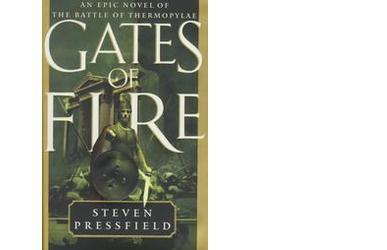Perhaps the greatest verbal and narrative genius currently in operation is the PR team guiding Tiger’s damage control. The wording of his statements has been pure poetry. And the overall strategy is unerring. His statement today about taking “indefinite leave” from golf is the latest tour de force of PR thinking. His team realized the damage was so severe, they could never spin out of it. They had to create an entirely new narrative: The Resurrection and Return. So first, Tiger had to go away, disappear, die, in a sense. Only then could he reemerge after some “indefinite” amount of time (to be determined by his PR team taking the national temperature), at which point the story would be no more about Tiger the Hound, the Big Disappointment, but the New, Chastened, Rededicated and Refocused Tiger. The Comeback Kid.
Author & Editor
Blog
Makes Strong Men Weep
 I had this great encounter with Pete, the uber-personal trainer at the Y. He’s a guy you might take for a stereotypical jock. He’s normally all about new ways to stress your core, but the other day he’d just read a book — a BOOK! — that had bowled him over, and he couldn’t stop talking about it. It was like someone newly (and gaggingly) in love who can’t stop going on about his beloved. And they say narrative is dead. Before we write the obit, we’ve got to account for Pete.
I had this great encounter with Pete, the uber-personal trainer at the Y. He’s a guy you might take for a stereotypical jock. He’s normally all about new ways to stress your core, but the other day he’d just read a book — a BOOK! — that had bowled him over, and he couldn’t stop talking about it. It was like someone newly (and gaggingly) in love who can’t stop going on about his beloved. And they say narrative is dead. Before we write the obit, we’ve got to account for Pete.
We did a small personality piece on Pete in The Washington Post Magazine, and in talking with him about that, it became apparent he didn’t read the magazine, or even the newspaper much. So his passion for the book, Gates of Fire by Steven Pressfield about the battle of Thermopylae, doubly surprised me.
“When I started getting near the end, I began to slow down because I didn’t want it to stop. And then when I read the last page, I almost began to cry,” he said.
Yes, the book, which is really about the culture of the Spartan warrior, does feature some rather extreme training methods (and by extreme I mean frequently fatal). So clearly, that got Pete’s professional attention. But it’s not what made him want to cry when he ran out of pages.
Pressfield does a great job of immersing his readers in an alien world, featuring unspeakable brutality, yet full engagement in the real stuff of life (which always includes the proximity of death). And he’s a master at building a narrative, creating characters you care about and constantly putting them in situations of high suspense. He also deeply understands the technique of leaving key storylines hovering in the background while he forges ahead with another high-action sequence. The unresolved issues, usually emotional ones, make the characters much more highly charged as they face the physical and tactical challenges of battle. The tension and excitement in the foreground effortlessly takes on a third dimension because of what you know about the emotional challenges pushed out of sight, but not forgotten.
Also, there is an oddly romantic appeal, especially to guys like Pete, of a life that is immediate, physical, close to the elements, purged of the falseness of modernity. A movie might also move Pete, but movies happen to you. You don’t feel like you are a participant, up inside the screen with all the characters. The power of written narrative is it brings the reader inside the pages, allows him to live there in his imagination. The “END” on the final page was a rude eviction notice, one worth crying over.
“I’m just waiting long enough to forget some of it,” Pete said, “then I’m going to read it again.”
I’ll Have What He’s Having
An add to my post on Stuever’s ability to turn the minutiae of contemporary culture into fascinating repartee. One time Stuever and I had lunch in one of those $18-a-salad restaurants. We had some business to discuss, but I don’t remember what. What I remember is that we very quickly fell into what I always considered the real business of lunch with Hank: a far-ranging discussion of movies, books, celebrity cults, political pretensions, cubicle culture, whatever. About halfway through the entree, a woman dining at the next table leaned over and said: “I’ve never been so entertained by an overheard conversation. I need new friends.”
The Gift of Christmas Present
 Hanging around with some families in the Texas exurbs for a few months before the holidays doesn’t seem like it would be all that riveting a subject for a book, but Hank Stuever has that unbelievably rare ability to peer deeply into the specific minutiae of contemporary culture and spin out insights that are both fascinating and hilarious.
Hanging around with some families in the Texas exurbs for a few months before the holidays doesn’t seem like it would be all that riveting a subject for a book, but Hank Stuever has that unbelievably rare ability to peer deeply into the specific minutiae of contemporary culture and spin out insights that are both fascinating and hilarious.
Like when he’s talking about this city built out of the arid Texas plains, he points out that everything is either “back when there were nothing but cows” or brand spanking new. The highways, the houses, the malls.
“Sometimes even the people feel brand-new – in pretty gift wrap. Billboards on newly widened streets advertise Lasik so you can see new, cosmetic veneers so you can smile new; 1-800 numbers extol the miracle of reverse vasectomies, because new things are happening all the time. People smile at me with brilliant white teeth, and before long they are hugging me hello and goodbye, I learn how new and improved pairs of frankenboobs feel as they briefly press against my chest in understanding hugs of welcome.”
So magically, Hank takes a boring, non-descript town, and generic run-of-the-mill encounters with its inhabitants – nothing but straw – and spins it into the pure gold of social commentary. Not to mention makes it fall-down funny.
This isn’t a “trick” of writing. His words are brilliantly chosen, but it’s not vocabulary that makes the magic. It is brilliant observation and the perception of patterns. He sees in this purely artificial metropolis the underlying mania for newness. He understands that the thing that drives people to desire to live in such places is a desperation to break from the entanglements, the many mistakes and messes of the past – whether it be personal disasters or the general untidy nastiness of a world with too many flaws. The only salvation is to sterilize everything by boiling it in out-of-the-box newness.
Ok, now you know Stuever’s trick is more like clairvoyance than magic. He sees things we don’t notice, connects dots we miss entirely. He’s sitting high on a hill, watching the human comedy play out from a distance, and saying: “Wow, did you see that? Did you notice this?”
But even though he seems like he’s watching from afar, it’s actually by plunging in up close and personal with the very real people of his study that he generates his best material. Getting close enough, for example, so that he can have one of his subjects actually seek his advice about a parenting dilemma she faces. Now, watch what Stuever does when he isn’t working with straw, but 24-karat gold:
“If Emily asks me if Santa Claus is real, what do you think I should tell her?” Tammie asks me, one afternoon when we’re alone, in another house that is getting the garland-on-the-staircase, feathers-on-the-tree, full-on Tammie treatment.
I am ever a reporter, and, it’s important to underline here, not a parent. Virginia O’Hanlon was 8 when she asked her famous question, and that seems to me like a fine age to get just a bit more real. I had my own “No, Virginia” moment when I was 7, after Christmas Eve Mass with my family. As I was escorted, half-asleep, from the car to my bed, I overheard one of my big sisters — Ann, always the loudest — telling my mother that I was dead asleep and it was okay to start setting up Santa’s unwrapped gifts to me under the tree. I shed not one tear.
As a treasured piece of journalism history, the full text of “Yes, Virginia” fails upon further scrutiny, if only because its ultimate message is that there is something inherently wrong with skepticism. If a child has concluded, all on her own, that it’s impossible for a man in a flying sleigh to make it all the way around the world in one night, delivering elf-made replicas of all the stuff you see in Target and Best Buy, then that’s a child I would be happy to steer toward a voting booth when she’s 18. That’s an American in search of facts. If, however, she goes on pretending to believe well into her teens (I encountered more than one such teenager in Frisco), because it makes her parents (and God) feel sweet and happy, then I become worried. That becomes an American willing to spend $100,000 on her “special day” wedding, or who will believe without hard evidence that other countries harbor weapons of mass destruction. The angst over Santa’s existence comes not from the children, I think, so much as the grownups. The adults literally tear up when I ask them to talk about how, and when, their child will learn there is no Santa. Once you know there is no Santa, then there’s no stopping the awful truth about everything else.
2009 Herald Hunt
Great Herald Hunt yesterday. For once, the weather cooperated. No, it didn’t “cooperate” — it actively collaborated, and colluded. It was an unindicted co-conspirator. The kind of mid-70s low humidity day that makes people still want to live in South Florida despite the quality of driving there. And here’s a fabulous Hunt quote in the paper today that perfectly captures the Hunt spirit:
“This might be it,” said Jeff’s brother, Rob, speaking of yellow dots on the pavement leading to the Venetian Causeway. “Absolutely not,” Jeff said. “I think that just might be for people working with the sewers . . . But we can’t rule anything out.”

The full story, as usual, struggled to explain the Hunt, but it also included the puzzle-by-puzzle explanation.
After the last Herald Hunt, which took people an hour and a series of hints to solve, we intentionally made this one easier, and we succeeded. Huge percentages of the 5,000 participants seemed to have genuinely solved most of the puzzles, and the winner solved the endgame — the Final Solution (which requires solving all the preliminary puzzles first) two minutes after we issued the final clue.
Most people seemed to enjoy being able to get so deep into the Hunt and still be competitive, but a few complained it didn’t require “enough brain power” as one woman down from DC for the Hunt put it. I said, “So you won, then?” And she said, “Um, no.”
“Well,: I said. “Maybe if we had made it easier still, you might have.”
In the Details
 Anyone who’s ever taken a writing course knows about the sacred totem of Significant Detail. Significant details are the small (or large) observations that say volumes about the subject of your piece. In the most powerful pieces, the significant details are SO significant, so perfect, they seem made up. You just can’t believe the writer got that lucky. And the best writers (who are also the best reporters) get lucky over and over again in spectacular, though non-sexual ways (sorry writer dudes, but being a great writer is no guarantee of female companionship, and I have abundant proof of that, though I refuse to name names).
Anyone who’s ever taken a writing course knows about the sacred totem of Significant Detail. Significant details are the small (or large) observations that say volumes about the subject of your piece. In the most powerful pieces, the significant details are SO significant, so perfect, they seem made up. You just can’t believe the writer got that lucky. And the best writers (who are also the best reporters) get lucky over and over again in spectacular, though non-sexual ways (sorry writer dudes, but being a great writer is no guarantee of female companionship, and I have abundant proof of that, though I refuse to name names).
So why do some writers get all the magical details? It’s either because they have an in with the Big Guy, or because the world is made simply loaded with magic braided into every crease and crevice of reality, and great writers have learned how to look for it and recognize it when they see it.
But really, it’s not that hard. The main trick is to KNOW that they’ll be there if you look for them. Then all you have to do is pay attention. Let’s imagine an example to illustrate how significant details pop up: A nice suburban family – mom, dad, two kids, two dogs — starts to fall apart. What details tell the story?
One day, the mom comes home with a new puppy, a cute, bouncy boxer. As you are admiring it, the dad comes out and makes a face: It was a surprise to him. He appears to laugh it off, but you wonder. A week later, dad comes home with a new Porsche Boxster. You happen to be there when he pulls into the driveway. Mom comes out, mouth open. This is the first she’s heard of it. She makes a joke of it, but really, how funny is a surprise purchase of a $50,000 car?
This family has always been yard-proud. The dad spends hours on his riding mower, keeping the large lawn well tended and fertilized. He’s planted a dozen small trees, including a peach tree which started bearing fruit a few years back, small but perfect and perfectly sweet peaches.
A few months after the boxer-Boxster incidents, some neighborhood teenager driving home after a beer bash late at night misses a bend in the road and plows straight into the peach sapling, totaling the car and sheering the tree off at bumper height. The gash in the lawn eventually heels, but the dead tree, about 6 feet of it with its tangle of branches, is simply tossed up under the shade of a spreading maple tree right in the center of the lawn. It would take about two minutes to drag the carcass across the lawn and toss it in the bordering woods, but that never happens. Ever. Season after season, the remains of the dead tree just sits there, a mess that just can’t be cleaned up or shoved under cover.
Six months later, you learn that the mom has moved out, marriage over, kids joint-custodied.
The spring comes again and the dad can still be seen out on his riding mower, the grass still perfectly manicured, the dead tree still rotting beneath the maple.
The point is, where there’s rot, there’s almost always a rotting peach tree. You just have to understand that, in one form or another, it will be there. All you have to do is keep your eyes open.
Dock’s No-No
This short animated film narrated by former MLB pitcher Dock Ellis about the day he pitched a no-hitter on LSD is a wonderful example of how an extended quote from someone with a less-than-omniscient perspective can tell a story far beyond what the speaker himself understands. You’ll see that the animator got that, and was filling in around the edges in a goofy, but funny way.
Theatrical Hell
When you come across a brilliant detail in a work of fiction, you might wonder, “Where do writers come up with this stuff.”
My guess: They had lunch with my friend Rachel, a brilliant young actress with a voracious appetite for ideas and ironies. Her artistic sensitivities are finely tuned, but she is also of that rare breed so deeply into drama that “experimental plays” and “alternative theater” are far more than punch lines to her. To those of us less attuned, her enthusiasms can appear, well, not to put too fine a point on it, fall-down-and-roll-around-on-the-floor funny. Here’s a description of a play she loved:
A one- man performance, by a mime, in which the mime appears to be struggling and failing to climb a mountain. FOR TWO HOURS.
You couldn’t possibly invent a more vivid image of theatrical hell for the average human than that. It has every form of tedium known to mankind all rolled up into a hyper-dense boulder of get-me-outtahere.
Wouldn’t it be beyond perfect for a Woody Allen vehicle, where his lust for the beautiful young thing forces him to sit through two hours of mimed frustration?
It would serve him right, of course, and that would be the point.
I Have Seen the Future of Journalism
… and it is surprisingly optimistic.
Just spoke at a high school journalism conference — 6,200 kids from around the country. There’s nothing like a Washington convention hotel filled to the rafters with bright, young, energetic, enthusiastic, having-the-time-of-their-lives 17 year olds. And this was a journalism conference?
I had to keep pinching myself. I’m thinking: what do they know that I don’t? What do they know that all the media pundits, corporate execs, Wall Street suits, and the moaning masses of working (and recently down-sized) journalists can no longer even imagine?
Based on the sheer tonnage of irrepressible perkiness I saw at the Wardman Marriott hotel this morning, I’d say that whatever problems journalism faces in the transition between a print world and a digital world will simply be swept away.
I told them about my first job in journalism, as a reporter at the Independent Florida Alligator – the Univeristy of Florida student paper. I knew even before college I wanted to be a writer. But I noticed something: I wasn’t actually writing anything. The only time I ever did was when I had a class assignment, and even then I couldn’t bring myself to do it until just before the deadline.
I had this realization while sitting on the side of a mountain on the island of Ibiza in Spain. It was toward the end of my junior year abroad program, and I had my journal with me, which I had barely written in. I was trying to write then, but it just wouldn’t come. So I was sitting there, all alone in this beautiful spot watching the waves of the Mediterranean beating on the red cliffs that jutted into the sea, and I thought: “What I need is a lot of deadlines.” Right then and there I decided that I would join the student newspaper.
When I got back to Gainesville, I found out where the office was and walked in unannounced. It was off an alley, a block off the main drag, in what used to be the kitchen of a greasy spoon restaurant. It appeared that nobody had even bothered to clean the place before the newspaper moved in, much less remodel. Directly above the news desk was an old stove hood, still thickly caked with black, toxic-looking grease. Beneath the hood was a guy with mustache and long brown hair who identified himself as the news editor.
“I’d like to write for the paper,” I said.
He asked if I had any experience.
“No,” I said.
“Doesn’t matter,” he said.
I asked him what did matter.
“Just show up,” he said.
And that’s been working for me ever since.
Like a Hawk
 Here’s the thing about cliches popping up in your writing: You’ve got to watch them like a hawk. But seriously folks, nobody’s immune. The first time anyone ever used that phrase to describe the need for intense attention, it was brilliant. Hawks can see a rodent in tall grass from 100 meters away. They not only have phenomenal eyesight, but they depend on it, and their attention to the smallest detail, for their survival. If a hawk isn’t paying attention, a hawk goes hungry. But after about the billionith use, “watch like a hawk” just became lazy. No listener or reader would be instantly calling up the image of a survival-driven creature with superior eyesight peering into the brush because its life depended on it. “Like a hawk” just became a compound word that meant “carefully,” in other words, just the kind of bland, nothing abstraction that metaphors and similies are meant to bring to life. But it still means something. It’s a big blinking sign saying, “NEED A PRECISE OBSERVATION HERE.”
Here’s the thing about cliches popping up in your writing: You’ve got to watch them like a hawk. But seriously folks, nobody’s immune. The first time anyone ever used that phrase to describe the need for intense attention, it was brilliant. Hawks can see a rodent in tall grass from 100 meters away. They not only have phenomenal eyesight, but they depend on it, and their attention to the smallest detail, for their survival. If a hawk isn’t paying attention, a hawk goes hungry. But after about the billionith use, “watch like a hawk” just became lazy. No listener or reader would be instantly calling up the image of a survival-driven creature with superior eyesight peering into the brush because its life depended on it. “Like a hawk” just became a compound word that meant “carefully,” in other words, just the kind of bland, nothing abstraction that metaphors and similies are meant to bring to life. But it still means something. It’s a big blinking sign saying, “NEED A PRECISE OBSERVATION HERE.”
In the recent instance, the writer was describing the startup of a small business. She’d just rented office space as market conditions went into decline. She was “watching every penny like a hawk.”
As a writer, as you read back that line, think of it as a cry for help. It tells you that you should replace the cliche with something intrinsic to the situation, something that makes that need for frugality more concrete. There are a million ways to do that, some better than others. But just consider a simple, direct solution, something like: “watching every penny like that would be the one that kept my office lights on.” It transforms the line from a groaner, to something that does some honest work for the development of an idea.
Recent Comments
- Tara Solomon on Acid Test, Optimized Edition
- Tom Shroder on My WaPo Travel Story On the Dordogne
- abriat christian on My WaPo Travel Story On the Dordogne
- Kerthy Fix on Acid Test’s Trip to the Movies
- Tom Shroder on Standing Up for Freedom
Archives
Copyright © 2024 Tom Shroder
Terms of Service & Privacy Policy | Data Access Request